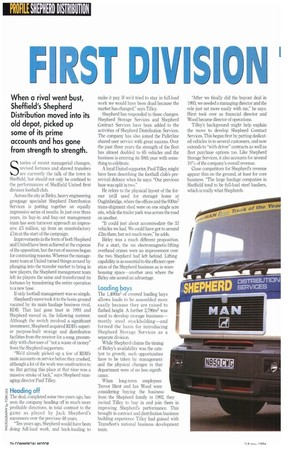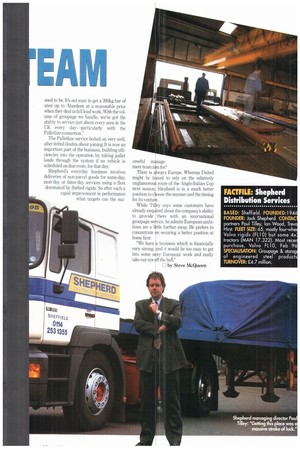FIRST' Dti...!
Page 80

Page 81

If you've noticed an error in this article please click here to report it so we can fix it.
Stories of recent managerial changes, revived fortunes and shrewd transfers are currently the talk of the town in Sheffield, but should not only be confined to the performances of Sheffield United first division football club.
Across the city at Birley, heavy engineering groupage specialist Shepherd Distribution Services is putting together an equally impressive series of results. In just over three years, its buy-in and buy-out management team has seen turnover approach an impressive .L5 million, up from an unsatisfactory Lim at the start of the campaign.
Improvements in the form of both Shepherd and United have been achieved at the expense of the opposition, but the run of success began for contrasting reasons. Whereas the management team at United turned things around by plunging into the transfer market to bring in new players, the Shepherd management team left its players the same and transformed its fortunes by transferring the entire operation to a new base.
If only football management was so simple.
Shepherd's move took it to the home ground vacated by its main haulage business rival, RDB. That had gone bust in 1993 and Shepherd moved in, the following summer, Although the switch involved a significant investment, Shepherd acquired RDB's superior purpose-built storage and distribution facilities from the receiver for a song, presumably with choruses of "not a waste of money" from the Shepherd supporters.
"We'd already picked up a few of RDB's main accounts on service before they crashed, although a lot of the work was unattractive to us. But getting this place at that time was a massive stroke of luck," says Shepherd managing director Paul Tilley.
Lti Heading off
m The deal, completed sonic two years ago, has o seen the company heading oft in much more
profitable directions, in total contrast to the igame as played by Jack Shepherd's 8 successors over the previous 48 years.
1.5 "Ten years ago, Shepherd would have been E doing full-load work, and back-loading to make it pay. If we'd tried to stay in full-load work we would have been dead because the market has changed," says Tilley.
Shepherd has responded to those changes. Shepherd Storage Services and Shepherd Contract Services have been added to the activities of Shepherd Distribution Services. The company has also joined the Palletline shared user service with great success. Over the past three years the strength of the fleet has almost doubled to 65 vehicles and the business is entering its 50th year with something to celebrate.
A loyal United supporter, Paul Tilley, might have been describing the football club's prerevival defence when he says: "Our previous base was split in two."
He refers to the physical layout of the former (still used for storage) home at Oughtibridge, where the offices and the 930m2 trans-shipment shed were on one single acre site, while the trailer park was across the road on another.
"It could just about accommodate the 33 vehicles we had. We could have got to around £2m there, but not much more," he adds.
Birley was a much different proposition. For a start, the six electromagnetic-lifting overhead cranes were an improvement over the two Shepherd had left behind. Lifting capability is as essential to the efficient operation of the Shepherd business as is warehousing space—another area where the Birley site scored an advantage.
Loading bays The 1,400m2 of covered loading bays allows loads to he assembled more easily because they are raised to flatbed height. A further 2,790m2 was used to develop storage business— mostly steel stockholding—and formed the basis for introducing Shepherd Storage Services as a separate division,
While Shepherd claims the timing of Birley's availability was the catalyst to growth, such opportunities have to be taken by management and the physical changes in that department were of no less significance, When long-term employees Trevor Hirst and Ian Wood were considering buying the business from the Shepherd family in 1992, they invited Tilley to buy in and join them in improving Shepherd's performance. This brought in contract and distribution business building experience Tilley had gained with Transfleet's national business development team.
"After we finally did the buyout deal in 1993, we needed a managing director and the role just sat more easily with me," he says. Hirst took over as financial director and Wood became director of operations.
Tilley's background might help explain the move to develop Shepherd Contract Services. This began first by putting dedicated vehicles in to several customers, and now extends to "with driver" contracts as well as fleet purchase options too. Like Shepherd Storage Services, it also accounts for around 10% of the company's overall revenue.
Close competitors for Shepherd's revenue appear thin on the ground, at least for core business. "The large haulage companies in Sheffield tend to be full-load steel hauliers, which is really what Shepherds used to be. It's not easy to get a 200kg bar of steel up to Aberdeen at a reasonable price when they deal in full-load work. With the volume of groupage we handle, we've got the ability to service just about every area in the UK every day—particularly with the Palletline connection."
The Palletline service bolted on very well, after initial doubts about joining It is now an important part of the business, building efficiencies into the operation by taking pallet loads through the system if no vehicle is scheduled on that route, for that day.
Shepherd's everyday business involves deliveries of non-parcel goods for same-day, next-day or three-day services using a fleet dominated by flatbed rigids. So after such a rapid improvement in performance what targets can the suc cessful management team an for?
There is always Europe. Whereas United might be forced to rely on the relatively unglamorous route of the Anglo-Italian Cup next season, Shepherd is in a much better position to choose the manner and the timing for its venture.
While Tilley says some customers have already enquired about the company's ability to provide them with an international groupage service, he admits European ambitions are a little further away. He prefers to concentrate on securing a better position at home first: "We have a business which is financially very strong, and it would be too easy to get into some sexy European work and really take our eye off the ball."


































































































































































